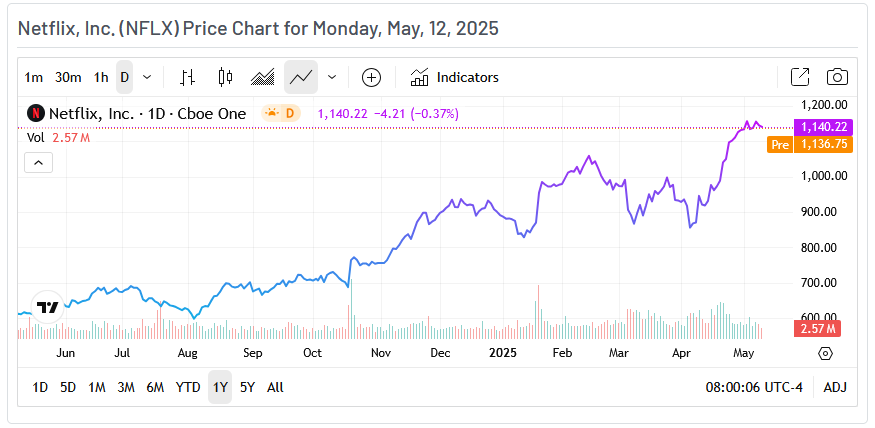In the current uncertain stock market, there are no clear-cut answers, as President Trump’s recently implemented trade tariffs are beginning to affect industries that were not initially identified as targets for these trading headwinds.
The technology sector, particularly the semiconductor and chipmaking industry in Asian regions, appeared to be the focus of attention when the announcements were made.
Nevertheless, these tariffs rapidly expanded to encompass the retail sector and, most recently, the entertainment industry. In light of the fact that certain nations have made minimal efforts to negotiate a deal with the United States, President Trump has devised more innovative methods to compel the market to engage in negotiations. His most recent strategic round of tariffs is targeting the film industry. Following the announcement of a 100% tariff on foreign-made films, the attention of the market was abruptly directed toward a one stock.
READ MORE: Netflix Launches Their Generative AI-powered Search Engine

The shares of Netflix Inc. have been experiencing a significant increase in value for the entirety of the year. Investors are of the opinion that the subscription business’s fundamental strengths and the capacity of management and analysts to predict future earnings and revenues could outweigh the volatility caused by trade tariffs, thereby facilitating more accurate future valuations and outlooks. Investors may wish to contemplate the following perspectives regarding Netflix’s latest advancements.
Netflix’s stock has experienced an impressive 88.8% increase in the past year, surpassing the majority of its peers and the broader S&P 500. This underscores the fact that Netflix’s value proposition was able to capture the attention and preference of investors as volatility and uncertainty affected the broader financial markets.
READ MORE: Before TV Upfronts, Netflix Co-CEO Reveals Subscriber And Advertising Strategies
Netflix’s stock price experienced a 4% decline in the past week as a result of the announcement of these 100% movie tariffs. Despite the initial negative reaction, there are a few factors to consider in the future of the stock that could potentially lead to more stability and optimistic outlooks in the months and quarters ahead.

Costs should be prioritized when devising strategies for potential scenarios that may arise as a result of these 100% tariffs; however, the stock’s future trajectory is anticipated by the broader market.
Institutions are amenable to uncertainty; this is the reason.
Netflix appears to have a distinct advantage in this new situation, despite the fact that its costs are expected to increase. This is due to the fact that a growing number of series and movies are produced internationally, as well as the fact that the number of foreign users is on the rise.
READ MORE: Samsung Television Proprietors Can Now Obtain Enhanced 4K HDR On Netflix
Netflix has several strategies to circumvent these new tariffs, given its substantial market share and expanding global presence in the entertainment industry. One of the initial, yet less apparent, options is for Netflix to outsource production to the United States for foreign creators in order to circumvent certain tariffs.
This would be advantageous to the organization in two distinct respects. Initially, it has the potential to mitigate some of the substantial additional expenses that are linked to the importation of foreign films. Secondly, it has the potential to generate political benevolence by increasing the production and exposure of the American landscape. This would entail an increase in investment in the nation, which could potentially result in grants and credits. [content-module:Forecast|NASDAQ:NFLX]

That one can be somewhat complex due to the numerous assumptions and multiple-choice options that are based on the company and other producers. The brand’s leverage and pricing power may be the source of a more straightforward strategy, which would circumvent some of the requirements for onshore production and additional logistics.
This simpler alternative is to increase prices, which may initially be perceived as negative due to the initial presumption that higher prices will decrease future demand. However, this issue is not exclusive to Netflix when investors expand out; it affects nearly all other entertainment companies.
Given this, the competition is on to determine who will be the first to raise prices and secure the supplementary audience before the rest of the industry is either compelled to undertake logistical onshoring or raise prices to avoid the additional burden. It is unsurprising that some of the most significant institutions are considering purchasing additional Netflix stock, given that both scenarios indicate that Netflix will emerge victorious.
Such as Natixis Advisors, which increased their Netflix stock holdings by 1% as of May 2025. Despite the fact that this may not appear to be a significant amount on a percentage basis, it did result in a high of $520.4 million for the group’s net position today, which is another indication of investor confidence in the future. This confidence may be filled with one of these two assumptions in the future.

Where should you allocate $1,000 at this time?
Listen to this information prior to your subsequent transaction.
On a daily basis, MarketBeat monitors the securities that Wall Street’s most highly rated and high-performing research analysts recommend to their clients.
Our team has identified the five stocks that top analysts are discreetly urging their clients to purchase before the broader market catches on… and none of the big-name stocks were on the list.
They are of the opinion that these five equities are the most advantageous investments for investors at this time.
Step into the ultimate entertainment experience with Radiant TV! Movies, TV series, exclusive interviews, live events, music, and more—stream anytime, anywhere. Download now on various devices including iPhone, Android, smart TVs, Apple TV, Fire Stick, and more!


